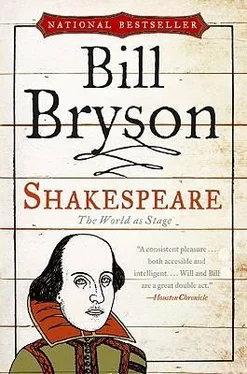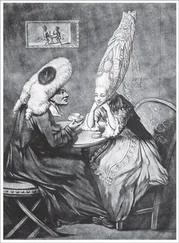Ivor Brown, a popular historian, meanwhile concluded from mentions of abscesses and other eruptions in Shakespeare’s plays that Shakespeare sometime after 1600 had undergone “a severe attack of staphylococcic infection” and was thereafter “plagued with recurrent boils.”
Other, literal-minded readers of Shakespeare’s sonnets have been struck by two references to lameness, specifically in Sonnet 37:
As a decrepit father takes delight
To see his active child do deeds of youth,
So I, made lame by Fortune’s dearest spite,
Take all my comfort of thy worth and truth.
And again in Sonnet 89:
Say that thou didst forsake me for some fault,
And I will comment upon that offense.
Speak of my lameness, and I straight will halt.
and concluded that he was crippled.
In fact it cannot be emphasized too strenuously that there is nothing-not a scrap, not a mote-that gives any certain insight into Shakespeare’s feelings or beliefs as a private person. We can know only what came out of his work, never what went into it.
David Thomas is not in the least surprised that he is such a murky figure. “The documentation for William Shakespeare is exactly what you would expect of a person of his position from that time,” he says. “It seems like a dearth only because we are so intensely interested in him. In fact we know more about Shakespeare than about almost any other dramatist of his age.”
Huge gaps exist for nearly all figures from the period. Thomas Dekker was one of the leading playwrights of the day, but we know little of his life other than that he was born in London, wrote prolifically, and was often in debt. Ben Jonson was more famous still, but many of the most salient details of his life-the year and place of his birth, the identities of his parents, the number of his children-remain unknown or uncertain. Of Inigo Jones, the great architect and theatrical designer, we have not one certain fact of any type for the first thirty years of his life other than that he most assuredly existed somewhere.
Facts are surprisingly delible things, and in four hundred years a lot of them simply fade away. One of the most popular plays of the age was Arden of Faversham, but no one now knows who wrote it. When an author’s identity is known, that knowledge is often marvelously fortuitous. Thomas Kyd wrote the most successful play of its day, The Spanish Tragedy, but we know this only because of a passing reference to his authorship in a document written some twenty years after his death (and then lost for nearly two hundred years).
What we do have for Shakespeare are his plays-all of them but one or two-thanks in very large part to the efforts of his colleagues Henry Condell and John Heminges, who put together a more or less complete volume of his work after his death-the justly revered First Folio. It cannot be overemphasized how fortunate we are to have so many of Shakespeare’s works, for the usual condition of sixteenth-and early seventeenth-century plays is to be lost. Few manuscripts from any playwrights survive, and even printed plays are far more often missing than not. Of the approximately three thousand plays thought to have been staged in London from about the time of Shakespeare’s birth to the closure of the theaters by the Puritans in a coup of joylessness in 1642, 80 percent are known only by title. Only 230 or so play texts still exist from Shakespeare’s time, including the thirty-eight by Shakespeare himself-about 15 percent of the total, a gloriously staggering proportion.
It is because we have so much of Shakespeare’s work that we can appreciate how little we know of him as a person. If we had only his comedies, we would think him a frothy soul. If we had just the sonnets, he would be a man of darkest passions. From a selection of his other works, we might think him variously courtly, cerebral, metaphysical, melancholic, Machiavellian, neurotic, lighthearted, loving, and much more. Shakespeare was of course all these things-as a writer. We hardly know what he was as a person.
Faced with a wealth of text but a poverty of context, scholars have focused obsessively on what they can know. They have counted every word he wrote, logged every dib and jot. They can tell us (and have done so) that Shakespeare’s works contain 138,198 commas, 26,794 colons, and 15,785 question marks; that ears are spoken of 401 times in his plays; that dunghill is used 10 times and dullard twice; that his characters refer to love 2,259 times but to hate just 183 times; that he used damned 105 times and bloody 226 times, but bloody-minded only twice; that he wrote hath 2,069 times but has just 409 times; that all together he left us 884,647 words, made up of 31,959 speeches, spread over 118,406 lines.
They can tell us not only what Shakespeare wrote but what he read. Geoffrey Bullough devoted a lifetime, nearly, to tracking down all possible sources for virtually everything mentioned in Shakespeare, producing eight volumes of devoted exposition revealing not only what Shakespeare knew but precisely how he knew it. Another scholar, Charlton Hinman, managed to identify individual compositors who worked on the typesetting of Shakespeare’s plays. By comparing preferences of spelling-whether a given compositor used go or goe, chok’d or choakte, lantern or lanthorn, set or sett or sette, and so on-and comparing these in turn with idiosyncrasies of punctuation, capitalization, line justification, and the like, he and others have identified nine hands at work on the First Folio. It has been suggested, quite seriously, that thanks to Hinman’s detective work we know more about who did what in Isaac Jaggard’s London workshop than Jaggard did himself.
Shakespeare, it seems, is not so much a historical figure as an academic obsession. A glance through the indexes of the many scholarly journals devoted to him and his age reveals such dogged investigations as “Linguistic and Informational Entropy in Othello,” “Ear Disease and Murder in Hamlet,” “Poisson Distributions in Shakespeare’s Sonnets,” “Shakespeare and the Quebec Nation,” “Was Hamlet a Man or a Woman?” and others of similarly inventive cast.
The amount of Shakespearean ink, grossly measured, is almost ludicrous. In the British Library catalog, enter “Shakespeare” as author and you get 13,858 options (as opposed to 455 for “Marlowe,” for instance), and as subject you get 16,092 more. The Library of Congress in Washington, D.C., contains about seven thousand works on Shakespeare-twenty years’ worth of reading if read at the rate of one a day-and, as this volume slimly attests, the number keeps growing. Shakespeare Quarterly, the most exhaustive of bibliographers, logs about four thousand serious new works-books, monographs, other studies-every year.
To answer the obvious question, this book was written not so much because the world needs another book on Shakespeare as because this series does. The idea is a simple one: to see how much of Shakespeare we can know, really know, from the record.
Which is one reason, of course, it’s so slender.
Chapter Two. The Early Years, 1564-1585
WILLIAM SHAKESPEARE WAS BORN into a world that was short of people and struggled to keep those it had. In 1564 England had a population of between three million and five million-much less than three hundred years earlier, when plague began to take a continuous, heavy toll. Now the number of living Britons was actually in retreat. The previous decade had seen a fall in population nationally of about 6 percent. In London as many as a quarter of the citizenry may have perished.
But plague was only the beginning of England ’s deathly woes. The embattled populace also faced constant danger from tuberculosis, measles, rickets, scurvy, two types of smallpox (confluent and hemorrhagic), scrofula, dysentery, and a vast, amorphous array of fluxes and fevers-tertian fever, quartian fever, puerperal fever, ship’s fever, quotidian fever, spotted fever-as well as “frenzies,” “foul evils,” and other peculiar maladies of vague and numerous type. These were, of course, no respecters of rank. Queen Elizabeth herself was nearly carried off by smallpox in 1562, two years before William Shakespeare was born.
Читать дальше
Конец ознакомительного отрывка
Купить книгу












